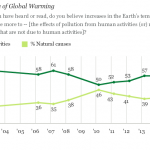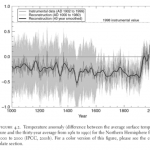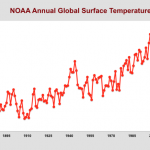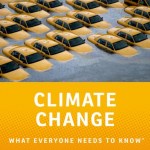Policy
... and why we never got the Equal Rights Amendment.
Donald Trump is a very good Republican candidate. In terms of both style and substance, Trump does a good job of representing that part of the Republican Party that has been in charge of that party for several years, the Tea Party. The Republican Party has built itself up to become, effectively, the majority party in the US by pandering to this part of the base, along with gerrymandering and other forms of voter suppression. So, really, there is no reason that Republicans running for office around the country should be upset with the…
Though not enough. And for the wrong reasons. But this is still good news.
Somewhere around 1990, but you could justify an earlier date if you like, science knew enough about global warming, the increase in the planet's surface temperatures caused by human release of greenhouse gas pollution and other human effects, to have initiated meaningful action to shift our energy supply away from fossil fuels. We didn't know exactly what would happen, but we knew stuff would happen. How long has it taken for this science to turn into effective policy to address global warming? We don't know, because…
I'm starting this post before any primary results are in, and I'll add the outcome of the primaries below, where I will also compare the results to my predictions and discuss what I think this means for the overall process of the Democratic primaries. But first, I wanted to get some thoughts down to contextualize my thinking on this. I'll publish this post now, at mid-day Tuesday, so look for an update late Tuesday night, or early Wednesday.
I like Hillary Clinton, and I often think that her presidency would be better than a Sanders presidency, with an inaugural in 2017. This is based on…
Climate Change: A Wicked Problem: Complexity and Uncertainty at the Intersection of Science, Economics, Politics, and Human Behavior, by Frank Incropera, is a textbook suitable for use in advanced high school or college classes, but also an excellent primer on the topic for anyone interested in it. Incropera spares little details in describing how the Earth's climate system works, and how human generated greenhouse gases, and other effects, change the energy balance of the planet to produce the phenomenon we call "global warming," and other effects.
Incropera addresses the panoply of causes…
I write about vaccines a lot here at Respectful Insolence, and for a very good reason. Of all the medical interventions devised by the brains of humans, arguably vaccines have saved more lives and prevented more disability than any other medical treatment. When it comes to infectious disease, vaccination is the ultimate in preventive medicine, at least for diseases for which vaccines can be developed. We also know that when vaccination rates fall, it opens the door for diseases once controlled to come roaring back. We saw this phenomenon with the measles a year ago in the Disneyland measles…
One of the most frequent claims of supporters of so-called "complementary and alternative medicine" (CAM), which goes by the Orwellian name "integrative medicine," is that it represents "integrating" alternative medicine with science-based medicine to produce the "best of both worlds." Of course, when I think of the best of both worlds, I usually think of The Best of Both Worlds, which might well be appropriate, except that, unlike the case when the Borg assimilate a species, when science-based medicine is forced to assimilate quackery, the quackery changes it, making it weaker, not stronger…
Cross-posted from CPRBlog
by James Goodwin
In case you didn’t get the memo: President Obama is entering the last year of his final term in office, so now we’re all supposed to be panicking over a dreaded phenomenon known as “midnight regulations.” According to legend, midnight rulemaking takes place when outgoing administrations rush out a bunch of regulations during their last few days in order to burnish their legacy or make concrete several of their policy priorities in ways that would be difficult for a successor—presumably from a different party—to undo. The legend further holds that…
At In These Times, reporter Joseph Sorrentino writes about the heartbreaking plight of uranium miners and millers as well as the history of uranium mining oversight and regulation. He spent a week interviewing uranium workers and their families in New Mexico — workers who are among the thousands who began working in the mines after 1971 and who don’t qualify for federal compensation under the Radiation Exposure Compensation Act (RECA). Sorrentino writes:
Cipriano Lucero worked in uranium mills from 1977 to 1982. He has pulmonary fibrosis, and one of his kidneys failed when he was 48,…
“What you get by achieving your goals is not as important as what you become by achieving your goals.” -Zig Ziglar
What a week it's been here at Starts With A Bang, where we've been proud to bring a number of stories to light for you. This past week, in case you missed anything, we've tackled:
Is the Universe itself alive? (for Ask Ethan),
How does space become transparent? The Orion Nebula answers (for Mostly Mute Monday),
The tragedy of Apollo 1 and the lessons that brought us to the Moon,
The future of astronomy: NASA's James Webb Space Telescope (the start of a new series), and
Monstrous…
The book is: Dark Money: The Hidden History of the Billionaires Behind the Rise of the Radical Right.
Also by the same author: The Dark Side: The Inside Story of How the War on Terror Turned Into a War on American Ideals.
Here is my version of recent American political history:
Everyone in America knows that if you want to identify the people or corporations, and the motivations, behind politics, you follow the money. Americans have historically differed in the degree to which they formulate this concept in their own minds as conspiratorial end-times ranting or shrug it off as just the way…
I have studiously avoided picking a Democratic candidate to support. I will not have to decide until Super Tuesday, when Minnesotans caucus to support one or another candidate. I like Hillary Clinton for a number of reasons, including the simple fact that she has considerable experience in the Executive branch, and is a person who can get things done. If I got to pick the president (skipping the election process entirely), I'd probably pick Sanders because I'm all in on the revolution in American policy. Both candidates are actually in close agreement on most of the key issues. Neither…
The Time Scales of Political and Climate Change Matter
The US is engaged in the laborious process of electing a new leader, who will likely be President for 8 years. Climate change has finally become an issue in US electoral politics. The climate policies of the next US President, and the Congress, will have a direct impact on the climate, because those policies will affect how much fossil carbon is put into the atmosphere over coming decades. So it is vital to consider what the climate may do during the next administration and the longer period that will include that administration’s…
by Jonathan Heller
Most public health practitioners, and those who work on health impact assessment specifically, want to improve the health of vulnerable populations. Most efforts to do so are well-intentioned, yet they often don’t lead to significant change. What do we need to do differently? Below is an analysis we at Human Impact Partners put forward.
What Do We Mean By Inequity and What Are Its Causes?
First, we are intentional in our choice of the word equity. Health inequities, as Margaret Whitehead said, are differences in health status and mortality rates across population groups…
By now you are probably aware of the major flooding that happened over the last several days in Missouri. Larry Lazar gave us a guest post detailing his personal experiences in Eureka, where the flooding was extensive. This flooding is not over, but is simply moving down stream in the Mississippi watershed. It will take several days before this is over.
We are long past the days when one can honestly say “you can’t attribute a given weather event to climate change.” Climate is weather long term, and weather is climate in the here and now. Climate has changed because of anthropogenic global…
I think this post might signal the birth of a new all-consuming blogging obsession -- climate change in general and specifically how the realities of climate change play out in the Canadian context, especially as it relates to public policy.
With the COP21 climate talks coming up in Paris, this seems like as good a time as any to focus more carefully and closely on what is probably the most defining issue of our times.
Not that this is the first time I've blogged about climate change. I've kept track of the issues fairly closely over the years and that has spilled into the blog, mostly in the…
As a surgeon and skeptic, I find neurosurgeon turned presidential candidate Ben Carson to be particularly troubling. I realize that I've said this before, but it's hard for me not to revisit his strange case given that the New York Times just ran a rather revealing profile of him over the weekend, part of which included Dr. Carson answering criticism for the really dumb things he's said about vaccines, evolution, and the like. People like Ben Carson are useful examples of how highly intelligent people who are incredibly competent in one area can also demonstrate unbelievable ignorance in…
Climate Change: What Everyone Needs to Know® by Joe Romm is just out, and is the most up to date examination of climate change science, the effects of climate change on humans, policy related problems, and energy-related solutions. Everyone should read this book, and if you teach earth system sciences you should consider using this book as a guide in your teaching, or in some cases, assigning it in class. The book is written to be read by general audiences, so it would work well in a high school or college setting.
As Romm points out, climate change will have more of an impact on humans,…
The question of whether it is worthwhile to debate cranks, quacks, and advocates of pseudoscience has long been a contentious issue in the skeptic community. Those of you who've been reading my posts for a while know that I've always come down on the side that it is not a good idea One thing I've learned in my more than a decade of blogging, both here and at my non-pseudonymous other blog, is that advocates of pseudoscience love public debates. Indeed, whenever you see a skeptic agree to a public debate with an advocate of pseudoscience, it's a damned sure bet that it wasn't the skeptic who…
The National Institutes of Health (NIH) has long been a key source of funding for medical research, but it wasn’t until 1986 that the agency formally established a policy of including women in clinical research. For decades, women received drugs and therapies that had been tested only on men, even though the same diseases can affect men and women differently, and women may metabolize drugs differently than men do.
In 1993, the NIH Revitalization Act put into law the requirement for women’s inclusion in NIH-funded clinical research. In 2010, the Institute of Medicine reported, “women’s health…
My library is hosting a Ada Lovelace Day event tomorrow (ok, a little late...). Continuing in a tradition of having Women in Science Wikipedia Edit-a-thons, we're hosting our own Wikipedia Women in Science Edit-a-thon!
I've been doing a fair bit of reading over the last couple of years about Wikipedia culture and especially how it relates to the under-representation of women both as editors and as subjects of articles. So I thought I'd share some of my readings here with all of you.
Of course, this list is in no way comprehensive or complete. I welcome suggestions for further readings in the…












